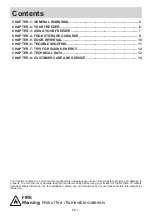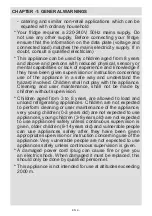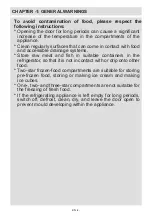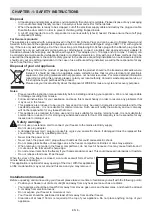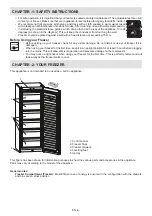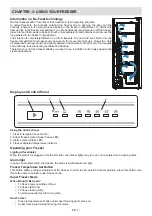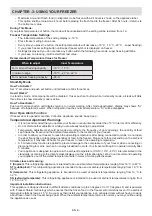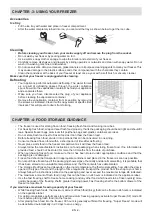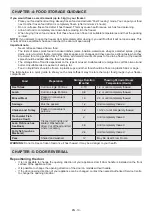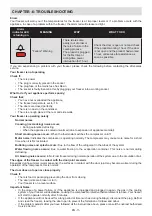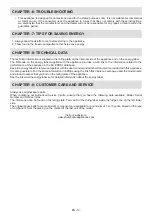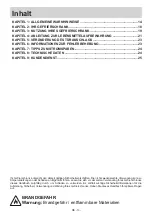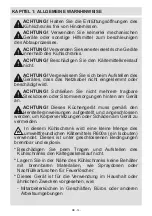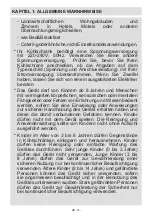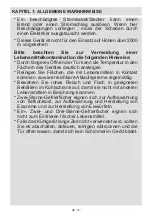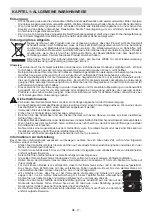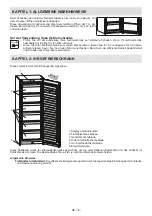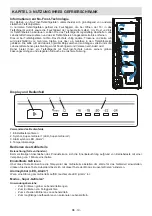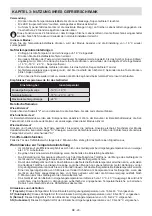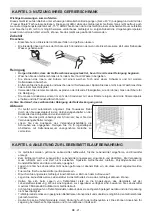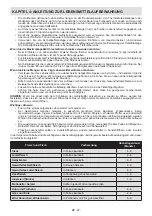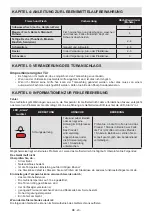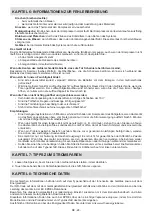
EN -9-
CHAPTER -3: USING YOUR FREEZER
Cleaning
• Before cleaning your freezer, turn your mains supply off and remove the plug from the socket.
• Do not wash your freezer by pouring water on to it.
• Use a warm, soapy cloth or sponge to wipe the interior and exterior of your freezer.
• Carefully remove all shelves and drawers by sliding upwards or outwards and clean with soapy water. Do not
wash in a washing machine or dishwasher.
• Do not use solvents, abrasive cleaners, glass cleaners or all purpose cleaning agents to clean your freezer. This
may cause damage to the plastic surfaces and other components with the chemicals they contain.
• Clean the condenser at the back of your freezer at least once a year with a soft brush or vacuum cleaner.
Make sure that your freezer is unplugged while cleaning.
Accessories
Ice tray
• Fill the ice tray with water and place in freezer compartment.
• After the water completely turned into ice, you can twist the tray as shown below to get the ice cube.
Defrosting
• Your appliance performs automatic defrosting. The water formed
as a result of defrosting passes through the water collection
spout, flows into the vaporisation container behind your appliance
and evaporates there.
• Make sure you have disconnected the plug of your appliance
before cleaning the vaporisation container.
• Remove the vaporisation container from its position by removing
the screws as indicated. Clean it with soapy water at specific time
intervals. This will prevent odours from forming.
CHAPTER -4: FOOD STORAGE GUIDANCE
• The freezer is used for storing frozen food, freezing fresh food, and making ice cubes.
• For freezing fresh food; wrap and seal fresh food properly, that is the packaging should be air tight and shouldn’t
leak. Special freezer bags, aluminum foil polythene bags and plastic containers are ideal.
• Do not store fresh food next to frozen food as it can thaw the frozen food.
• Before freezing fresh food, divide it into portions that can be consumed in one sitting.
• Consume thawed frozen food within a short period of time after defrosting
• Never place warm food in the freezer compartment as it will thaw the frozen food.
• Always follow the manufacturer's instructions on food packaging when storing frozen food. If no information is
provided food, should not be stored for more than 3 months from the date of purchase.
• When purchasing frozen food, make sure that it has been stored under appropriate conditions and that the
packaging is not damaged.
• Frozen food should be transported in appropriate containers and placed in the freezer as soon as possible.
• Do not purchase frozen food if the packaging shows signs of humidity and abnormal swelling. It is probable that
it has been stored at an unsuitable temperature and that the contents have deteriorated.
• The storage life of frozen food depends on the room temperature, the thermostat setting, how often the door is
opened, the type of food, and the length of time required to transport the product from the shop to your home.
Always follow the instructions printed on the packaging and never exceed the maximum storage life indicated.
• The maximum amount of fresh food (in kg) that can be frozen in 24 hours is indicated on the appliance label.
• Use the fast freezing shelf to freeze home cooking (and any other food which needs to be frozen quickly) more
quickly because of the freezing shelf’s greater freezing power. Fast freezing shelf is the bottom drawer of the
freezer compartment.
If you would use maximum freezing capacity of your freezer:
• While freezing fresh foods, the maximum amount of fresh food (in kg) that can be frozen in 24 hours is indicated
on the appliance label.
• For optimum appliance performance to reach maximum freezing capacity, activate Super Freeze (SF) mode 30
hours before placing fresh food into the freezer.
• After placing fresh food into the freezer, 30 hours is generally sufficient for freezing. ”Super Freeze” mode will
be deactivated automatically in 2-3 days to save energy.



